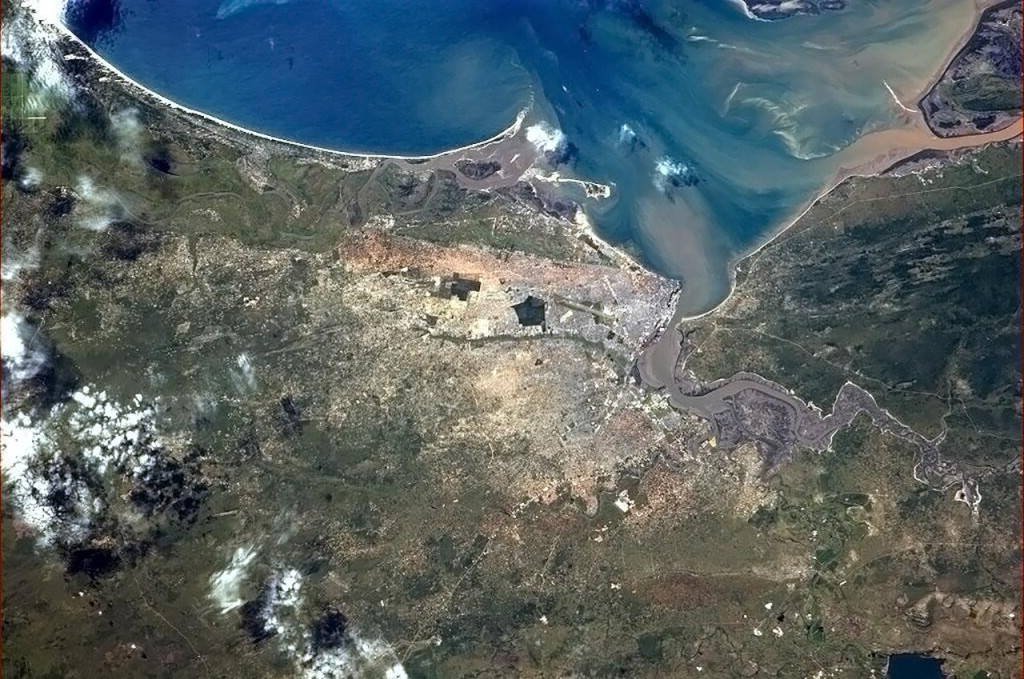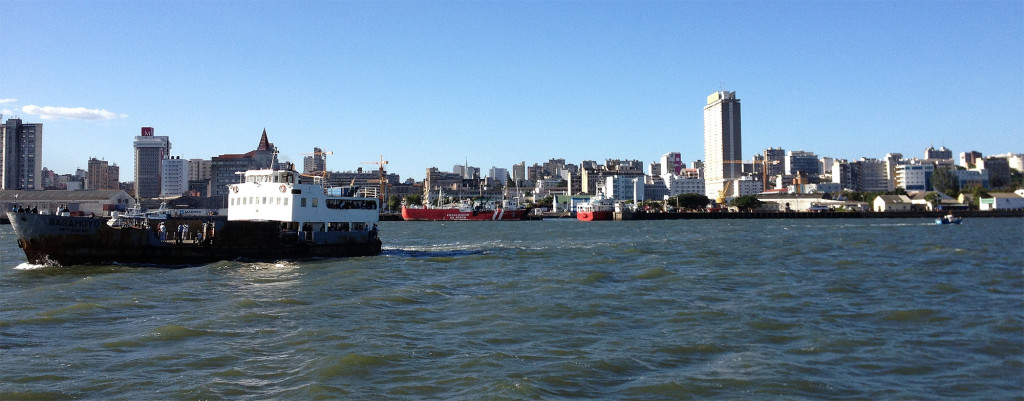We often share hypothetical “What If?” survival scenarios in order to convey lessons about self-defense and preparedness. However, we recently received an email from a reader who shared a real-life story about a potentially dangerous scenario he dealt with while working overseas. His name is CJ Lozano, and he works for a boat-building company that often works under contract with the U.S. government and armed forces.

A photo of Maputo, the capital of Mozambique, taken from the International Space Station. Source: NASA / Chris Hadfield
One particular contract led CJ to Mozambique, a nation located on the southeastern coast of Africa. Mozambique was formerly a Portuguese colony, and the official spoken language there is still Portuguese to this day. After gaining its independence in 1975, the country underwent a violent civil war from 1977 through 1992. Crime and corruption remain major issues in Mozambique, according to the U.S. Agency of International Development, and CJ's story illustrates how these factors can directly impact foreigners.
Here is CJ's story, which he recounted to us via email. It may prove valuable to those who travel overseas to locales where corruption is a serious threat, whether that's Rio de Janeiro for the Olympics, or any number of seemingly-safe tourist destinations. Be aware, plan ahead, and learn from CJ's survival story.

Thank you for the invitation to share my story. I am a salesman/trainer in a small boat building company, and I sell boats to the U.S. government. When we get contracted to go overseas, we are pretty much on our own unless there is a high threat level. Then we get to tag on to the government employees who may be traveling with us.
In my story, I was traveling with a government employee, who is a good friend of mine. He stayed in-country one week and I was scheduled for two weeks. During the first week we traveled from the hotel to the waterfront in Maputo a number of times. On one occasion, after visiting the U.S. Embassy, we basically got held up by police in front of the embassy for making an illegal U-turn. After being intimidated by the police, who were armed with AK-47s, I paid a “fine” of about $20 US and we were on our merry way.
The day after my friend left, I was down at the port working on the boats, and decided to walk into town a few blocks away to look for a place to eat. I found myself in a neighborhood with typical street scenes, women carrying baskets on their heads, et cetera. So, I took out my camera to get some photos. There also happened to be four local police officers conducting “traffic stops” a block away. I noticed them, but thought nothing of it.

Maputo, the capital of Mozambique, is located alongside a large bay and estuary. Source: Gustavo Sugahara / Wikipedia
After taking a few photos, I noticed citizens yelling over to the cops. I was walking back towards the port when they stopped conducting their traffic stops, and basically surrounded me. Now understand, all of this was being done in Portuguese, which I do not speak. Here I found myself behind a building, surrounded by four police officers armed with AKs, all of whom were probably no older than 25 and carrying weapons that weighed probably a tenth of their body weight.
They made it very clear that they wanted $150 US, as I had broken a law for taking “illegal” pictures. Otherwise, they would throw me in jail. Now, I had been warned about taking photos around the presidential palace or government buildings, but nothing of the sort was anywhere close to where I was currently standing. I tried to make them understand that I was with the U.S. Embassy/Military. When that did not work, I pulled out a cellphone given to me by the colonel at the embassy to contact him if needed.
I got the colonel on the line and explained the situation to him. He advised me not to pay them a dime and to hand the phone over to the head police officer, which I gladly did. Now if anyone has ever been in a situation like this, they understand when I say my mind was racing. It occurred to me that any photo on my camera would be considered “illegal”, so I very quietly slipped the memory card out of my camera and hid it in a pocket in my pants. Then, as the phone conversation continued between the police and colonel, I began what I call my Jason Bourne evaluation of the policemen, and how I could do some serious harm to them before being beat down or killed. After zoning out on that for a few seconds, I realized I was being stupid, and tried to pay attention to what was happening. At least I had a plan of action if things went downhill fast.
The officers eventually handed the phone back to me, and the colonel advised me again not to pay them anything and to try to keep from being taken to jail. Basically, the cavalry was on the way. After hanging up, the bribe money demands suddenly started being reduced, but I continued to refuse them all. Finally, they decided they wanted to see my camera. Aha! I expected it to be destroyed in front of me but they only wanted to see the photos. Aha again! After turning it on, NO PICTURES on the magic box! Finally, they realized they had nothing on me, and that they weren’t going to get anything, so they told me to leave.
Knowing that the colonel was on the way and could ruin their lives and jobs, they scattered to the wind. I immediately phoned the colonel again and he called the troops off. I made my way back to my car, making sure no one was following me (I still had a week to work in that area), and returned to the hotel. Once there, after letting everything sink in, I proceeded to drink a bottle of rum just to calm my nerves.
The moral of the story, and my lessons learned when traveling overseas:
I hope this helps someone when the rubber meets the road. The information you provide is not just for situations in a movie. This stuff really does happen on a daily basis, and the better prepared you are, the better chances you have of coming out on the good end.
All the best, and God Bless America. – CJ Lozano
Do you have your own real-life survival story to tell? We'd like to hear it. Message us on Facebook, or click here to contact me directly.
 STAY SAFE: Download a Free copy of the OFFGRID Outbreak Issue
STAY SAFE: Download a Free copy of the OFFGRID Outbreak Issue
No Comments